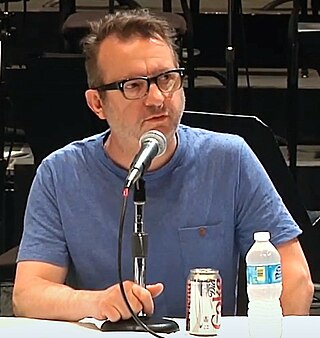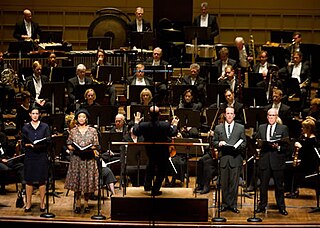Related Research Articles

Mark-Anthony Turnage is an English composer of contemporary classical music.
John Paul Corigliano Jr. is an American composer of contemporary classical music. With over 100 compositions, he has won accolades including a Pulitzer Prize, five Grammy Awards, Grawemeyer Award for Music Composition, and an Academy Award.
John Harris Harbison is an American composer and academic.

Steven Edward Stucky was a Pulitzer Prize-winning American composer.
Hila Plitmann is an Israeli-American two-time Grammy Award-winning operatic soprano, songwriter, and actress specializing in the performance of new works.
Peter Goddard Lieberson was an American composer of contemporary classical music. His song cycles include two finalists for the Pulitzer Prize for Music: Rilke Songs and Neruda Songs; the latter won the 2008 Grawemeyer Award for Music Composition and both were written for his wife, the mezzo-soprano Lorraine Hunt Lieberson. His three piano concertos were each premiered by the pianist Peter Serkin, with the 1st and 3rd also being Pulitzer finalists.
Michael Nathaniel Hersch is an American composer and pianist. He currently serves as faculty at the Johns Hopkins Peabody Conservatory in Baltimore, Maryland, where he completed his own studies in music composition. The New York Times has commented that he writes "extraordinarily communicative music" and that "Mr. Hersch's music speaks for itself eloquently".
The Double Concerto for Harpsichord and Piano with Two Chamber Orchestras is a composition by the American composer Elliott Carter. The work was commissioned by the Fromm Music Foundation and is dedicated to the philanthropist Paul Fromm. It was completed in August 1961 and was first performed at the Metropolitan Museum of Art's Grace Rainey Rogers Auditorium on September 6, 1961. The premiere was performed by the harpsichordist Ralph Kirkpatrick and the pianist Charles Rosen under the conductor Gustav Meier.
The Symphony No. 6 is a composition for mezzo-soprano solo and orchestra by the American composer John Harbison. The work was commissioned by the Boston Symphony Orchestra under the conductor James Levine. It was composed in 2011 and was given its world premiere in Boston on January 12, 2012 by the mezzo-soprano Paula Murrihy and the Boston Symphony Orchestra under the direction of David Zinman. The piece is dedicated "in friendship and gratitude" to James Levine, who would have conducted the premiere had he not retired from his post as the music director of the Boston Symphony Orchestra due to health concerns.
The Symphony No. 5 is a composition for baritone, mezzo-soprano, and orchestra by the American composer John Harbison. The work was commissioned by the Boston Symphony Orchestra under the conductor James Levine. It was given its world premiere in Boston on April 17, 2008 by the mezzo-soprano Kate Lindsey, the baritone Nathan Gunn, and the Boston Symphony Orchestra directed by James Levine. The text of the piece is set to Orpheus and Eurydice by Czesław Miłosz, Relic by Louise Glück, and the Sonnets to Orpheus by Rainer Maria Rilke.
Milosz Songs is a composition for soprano and orchestra by the American composer John Harbison. The work was commissioned by the New York Philharmonic for the soprano Dawn Upshaw and is set to the poetry of the Polish writer Czesław Miłosz. It was given its world premiere in New York City on February 23, 2006 by Upshaw and the New York Philharmonic under the direction of Robert Spano.
The Pied Piper Fantasy is a concerto for flute and orchestra by the American composer John Corigliano. The work was commissioned by the flutist James Galway and it is based on the tale of the Pied Piper of Hamelin. The piece was given its world premiere by Galway and the Los Angeles Philharmonic under the conductor Myung-whun Chung at the Dorothy Chandler Pavilion on February 4, 1982. In 1993, the critic Mark Swed of the Los Angeles Times described it as "one of the best known of modern American concertos."
The Mannheim Rocket is a short orchestral composition by the American composer John Corigliano. The work was commissioned by the Mannheim Orchestra, which first performed the work on March 26, 2001. The piece is dedicated to Susan Carlyle.
America: A Prophecy (sometimes stylized as America (A Prophecy)) is a composition for mezzo-soprano and orchestra with an optional chorus by the British composer Thomas Adès. The work was commissioned by the New York Philharmonic with financial contributions from the Francis Goelet Fund. It was given its world premiere by the mezzo-soprano Beth Clayton, the Westminster Symphonic Choir, and the New York Philharmonic under the direction of Kurt Masur at Avery Fisher Hall on November 11, 1999.
Vocalise is a composition for soprano, electronics, and orchestra by the American composer John Corigliano. The work was commissioned by the New York Philharmonic under the direction of Kurt Masur with financial contributions from the Francis Goelet Fund. It was given its world premiere by the soprano Sylvia McNair and the New York Philharmonic under Masur at Avery Fisher Hall on November 11, 1999. The piece is dedicated to Sylvia McNair.
Two Controversies and a Conversation is a composition for piano, percussion, and chamber orchestra by the American composer Elliott Carter. Its world premiere was given on June 8, 2012 at the Metropolitan Museum of Art in New York City by the pianist Eric Huebner and the percussionist Colin Currie with the New York Philharmonic under the direction of David Robertson. The piece is dedicated to Colin Currie and the pianist Pierre-Laurent Aimard. It was one of the last works composed by Carter, who completed the piece at the age of 103.

Totentanz is a composition for baritone, mezzo-soprano, and orchestra by the British composer Thomas Adès. The work was commissioned by Robin Boyle in memory of the composer Witold Lutosławski and of his wife Danuta. Its world premiere was given in the Royal Albert Hall during The Proms on July 17, 2013 and was performed by the baritone Simon Keenlyside, the mezzo-soprano Christianne Stotijn, and the BBC Symphony Orchestra under the direction of Adès.
Karawane is a composition for chorus and orchestra by the Finnish composer Esa-Pekka Salonen. The work was jointly commissioned by the Tonhalle Orchester Zürich, the Swedish Radio Symphony Orchestra, the New York Philharmonic with support from the philanthropist Marie-Josée Kravis, the Bamberg Symphony, and the Finnish Radio Symphony Orchestra. It was first performed by the Tonhalle Orchester Zürich and the Zürcher Sing-Akademie conducted by Lionel Bringuier in the Tonhalle, Zürich, on September 10, 2014. The piece is set to the eponymous poem by the German author and Dadaist Hugo Ball.
The Canta-Concerto is a concerto for mezzo-soprano and orchestra by the American composer Marc Neikrug. The work was commissioned by the New York Philharmonic and was completed in May 2014. It was first performed by the mezzo-soprano Sasha Cooke and the New York Philharmonic under the direction of Alan Gilbert at David Geffen Hall on October 1, 2015. The piece is dedicated to Alan Gilbert.
Gathering Paradise is a song cycle for soprano and orchestra set to the poetry of Emily Dickinson by the American composer Augusta Read Thomas. It was written in 2004 on a commission by the New York Philharmonic under the direction of Lorin Maazel, both to which the piece is dedicated "with admiration and gratitude." Its world premiere was performed by the soprano Heidi Grant Murphy and the New York Philharmonic conducted by Maazel in Avery Fisher Hall, New York City, on September 29, 2004.
References
- 1 2 3 4 Corigliano, John (2010). "One Sweet Morning (for voice and orchestra)". G. Schirmer Inc. Retrieved March 6, 2016.
- ↑ Pelkonen, Paul (September 30, 2011). "John Corigliano, New York Philharmonic composer, underscores hope in new cycle with 'One Sweet Morn'". New York Daily News . Retrieved March 6, 2016.
- ↑ Tsioulcas, Anastasia (September 7, 2011). "John Corigliano On Sept. 11: The Heartbreak Of Battle". Deceptive Cadence. NPR . Retrieved March 6, 2016.
- ↑ Kozinn, Allan (September 23, 2011). "An Untethered Approach Is Back in Style". The New York Times . Retrieved March 6, 2016.
- ↑ Midgette, Anne (April 9, 2003). "Dissonant Thoughts On the Music Pulitzers". The New York Times . Retrieved March 6, 2016.
- ↑ Tommasini, Anthony (October 2, 2011). "Song Cycle Places One Indelible Day Along History's Bleak Continuum". The New York Times . Retrieved March 6, 2016.
- ↑ Cowan, Rob (March 2013). "BARBER Essay No 1 CORIGLIANO One Sweet Morning DVOŘÁK Symphony No 7: Three works from New York including 9/11 premiere". Gramophone . Retrieved March 6, 2016.
- ↑ Bernheimer, Martin (October 4, 2011). "New York Philharmonic/Corigliano, Avery Fisher Hall, NY". Financial Times . Retrieved March 6, 2016.